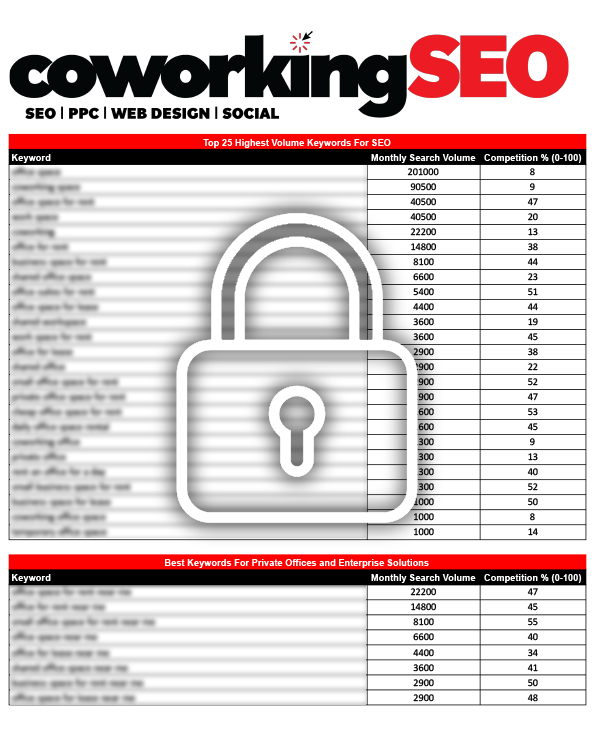Are you ready to take your commercial real estate marketing business to the next level?
In today’s highly competitive market, it is important to have a commercial real estate marketing strategy to help you stand out and attract the attention of tenants and investors who are increasingly demanding speed and frictionless experiences while searching for new property and investment opportunities.
More than 80 buyers and tenants start their property search on the internet today. To effectively market your commercial real estate listings and stand out against the competition, you need to develop a marketing strategy that goes beyond flyers, brochures, and LoopNet listings.
Here are 20 key marketing strategies to help you grow your commercial real estate business and expand your digital footprint.

1. Establish Your Goals and Determine Your Ideal Audience
To create a successful marketing strategy for commercial real estate, you must first understand your audience and objectives. It’s hard to develop a marketing strategy that will resonate with clients and drive business growth without these two factors.
Answer the following questions before moving on to the next step:
- What are your clients’ key criteria for making decisions?
- What sites do your customers visit?
- How will you reach out to them?
- What are the creative assets you will need to create?
- What are the tools and resources you will need?
- What is your budget for the year?
- How will you define success?
Do a quick study of how your competitors are marketing themselves and their properties. Then, think about ways you can stand out and differentiate yourself.
By taking the time to define your unique differentiations, you will be able to create a solid foundation for future marketing materials and communications.
2. Develop a Commercial Real Estate Marketing Plan
What is an estate marketing plan? How do you create one?
A marketing plan gives you a complete overview of your mission, your unique selling point, the audience you are targeting, and the metrics that will be used to measure success.
Include your:
- Business Summary
- Target market and audience
- Budgets are available for all budgets.
- Marketing channels
- Marketing material
- The following are the metrics that you can use to measure your effectiveness:
A good commercial real estate marketing plan should include a balanced marketing mix that leverages Earned Media, Paid Media, and Owned Media.
Earned Media– Includes marketing activities you “earn” from advocates of your brand, and includes free channels like SEO, Social Media.
Paid Media– Any performance-based channel or paid advertising such as banners, cost-per-click, remarketing, and paid advertising.
Owned media– This includes media assets that you own, such as websites, blogs, and social media profiles.
The marketing mix should be spread across multiple channels to reduce the risk of failure in one marketing area.
Start mapping the elements you will need to implement your strategy.
Plan what content you will need to market your property based on the type of asset and the audience. The budgets for producing content to showcase a multifamily home may differ from those for marketing industrial property.
3. What Tools and Software Do You Need?
You need the right tools to execute a successful marketing strategy for commercial real estate. Your “marketing stack” is a collection of tools that cover a wide range of uses and requirements. From contact management to email marketing to listing presentations and more.
You should give your technology selection the attention it needs so that you won’t need to change platforms. Switching from one real estate marketing software platform to another is expensive and can reduce productivity.
Businesses that optimize and streamline their marketing processes are more likely to achieve sustained growth.
4. Upgrade Your Website
It is important to remember that your company’s website will often be the first impression a prospective client gets of you. This can help to build trust and confidence in prospects.
You can use it as a marketing tool to showcase company news, show thought leadership with blog posts and research, and market your properties using a search engine for commercial property.
Before you begin a relationship, you should ask questions to gauge the agency’s experience and professionalism.

5. Create Feature-Rich Property Websites
If you don’t create a strong digital presence for your property, your competitors will eat your lunch in 2020.
Interactive property websites can be a great tool to display your commercial properties. They can be used as a hub for all your marketing efforts related to commercial properties. But they also can add a “wow” element that will help you engage and convert more visitors.
Content-rich sites are a key component of high-performance property websites.
- Professional Photography
- Video Footage
- Virtual tours in 3D
- Information on availability
- Floor plan PDFs
- Interactive Maps
For your inspiration, here’s a collection of 40 top commercial real estate websites.
6. Segment and Build Targeted Email Campaigns
A cost-effective email marketing strategy for commercial real estate can be used to engage prospects in conversation and close deals.
One of the most important marketing strategies you can use to fuel your leasing or sales efforts is building and segmenting a list of prospects.
You can start by building it through your website, blog, and lead capture pages. You can use email marketing software, or a real estate commercial CRM to store your contacts.
7. Add Your Listings on Commercial Real Estate Portals
Listing services and portals for commercial real estate are an excellent way to market your property, whether it is for sale or lease. They allow you to target and generate exposure to a targeted audience.
There are many other real estate listing websites that you can use to market your property and generate leads.
8. Create a Google My Business Page
Google My Business helps local businesses to promote themselves online. It is free. The searcher can find relevant results based on their location.
Create a Google My Business listing for your business to give it more visibility. This will ensure that your property is listed on Google Maps and the first half of Google search. The searchers can see your property and the surrounding area before they visit you to get more information.
You can also use your business profile to upload photos, to promote new products, or to respond to customer reviews. You can also use it to update your business information so that people searching for you always know how to contact you.
9. SEO Optimize Your Website
As early as you can, create a real estate search engine optimization plan. Search engine visibility can be a powerful tool for your business, driving tenants, brokers, and investors toward your website.
It can take several months before you start to see the results of SEO.
10. Useful Content to Nurture Contacts
Nurturing contacts with content can help you stay in their minds and encourage them to engage with your company.
Most commercial real estate firms don’t know where to begin or what to do.
Content marketing is not just about being part of the noise.
Produce high-quality, entertaining, or relevant content. You can do this in many ways, including blog posts, market research, infographics, and videos.
11. Share Your Content on Social Media
social marketing for commercial real estate can be a free way to increase brand awareness and bring more traffic to your site. Social media is also used by savvy commercial real estate professionals to facilitate connections and spark conversations with potential clients and partners.
When used correctly, LinkedIn can be an effective tool to increase attention to your real estate listings. You can also use Twitter and Facebook. These
three social media platforms are the most effective for commercial real estate and should be where your company is most active.

12. Create a Paid Social Media Advertising Strategy
You can also increase awareness of commercial real estate by using advertising campaigns on Twitter, Facebook, and LinkedIn that are based on performance.
These platforms allow you to create very targeted campaigns. You can choose who, where, and when your ads are shown.
If you’re leasing a property in the life sciences industry, you might launch a marketing campaign that targets C-level executives from the biosciences in a certain geography.
13. Publication of Press Releases Is a Regular Practice
Press releases are a great way to reach out to people who may be able to add your company’s information to a magazine.
Do some research before sending out a release to determine who is responsible for the section on commercial real estate in the publications that you are targeting. It is important to send the information you need to the right people to get the response that you desire.
You’ll find their email addresses on their bios or under other articles about commercial real estate.
You’ll eventually be able to create your “black book” with influencers. This is a valuable asset that can save you thousands in PR agency fees. They often spend the majority of their time on outreach.
You may not receive much response to your first press release, but you should keep sending them. You never know when one of them will be picked up.
Relationships with journalists, bloggers, and influencers can be very rewarding. Press mentions are a powerful way to boost your brand’s awareness.
A “black book” is an invaluable asset that will save you thousands in PR agency costs. These agencies spend the majority of their time on outreach.
14. Create a Google Keyword Campaign
Google receives 500 million searches per day, and your clients will likely be searching for keywords related to your business or commercial property right now.
Google Adwords can be a powerful channel for acquiring commercial real estate advertising, but keywords in real estate can be expensive based on the market you are targeting. Adwords allows you to set your budget at whatever level you are comfortable with. You can also stop the campaign at any time.
15. Create paid commercial real estate ads through display campaigns
Display advertising is available in many formats. It can raise brand awareness, and reach thousands (or even millions) of people quickly.
Adwords, for example, can be used to advertise commercial real estate. It allows you to target your ads very precisely and you decide which websites your Ads will appear on.
16. Remarketing Is a Great Way to Target Your Visitors.
Remarketing is more than just display advertising. A cookie is placed on the computer of a visitor to your site so that you can show them relevant Ads on other websites.
It is a great way to keep your website or property listings “top-of-mind” and to drive previous visitors back to the site.
17. Attend Industry Events and Conferences
Commercial Real Estate Events offer a fantastic opportunity to build relationships, create leads, and gain knowledge about industry trends and the market.
Other marketing channels make it difficult to establish many relationships or have in-person interactions in a short time. It’s important to have an event marketing strategy that is well-defined because participation and attendance can be expensive.
18. Advertise in Trade Journals
Trade journals in commercial real estate are read by thousands of brokers, potential investors, and industry peers every day.
Most industry magazines offer advertising options to advertise commercial real estate before a national audience, or a regional one.
Advertising in trade journals for commercial real estate can be a great way to increase your firm’s visibility, and credibility and generate leads.
19. Leverage Video for Your Properties
Video can be a powerful tool for marketing commercial real estate, as it allows buyers and tenants to see the property in action before they visit it.
Video tours are a great way to showcase the unique features of the property and give a feel for its size and layout. This can help generate interest and speed up the decision-making. Videos and 3D virtual tours can also be shared easily on social media platforms and other online platforms to increase the visibility of a property.
20. Measure Your Success
Never forget this simple adage.
If you can’t quantify it, don’t mess it up.
Measuring the success of commercial real estate marketing activities is critical to a successful strategy. Define key metrics to measure the success of each marketing channel, create a report on real estate marketing, and use data-driven decision-making to improve your efforts.
Don’t let your strategy get stale. Test ideas and tactics constantly to determine what works, and what does not.
Don’t forget to consider how your marketing strategy impacts your business goals. You need to rethink your marketing strategy if you cannot quantify the impact of your efforts to lease up, sell or retain tenants (or anything else).







